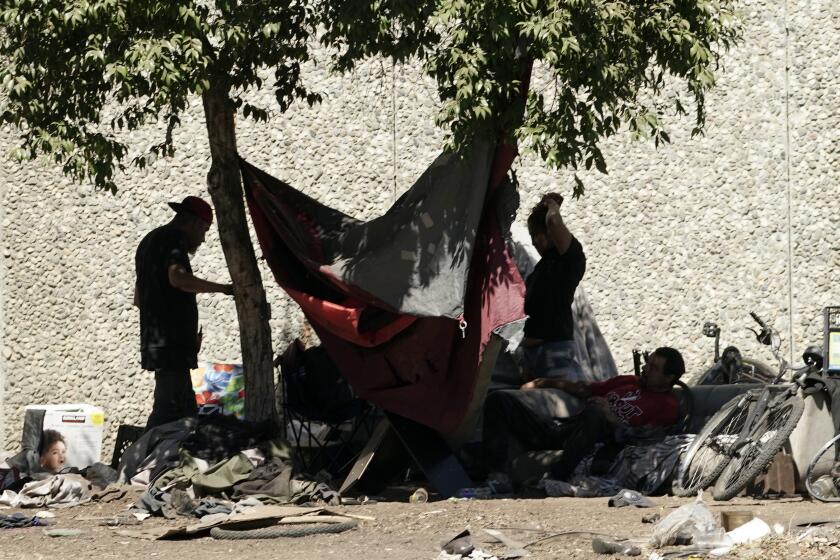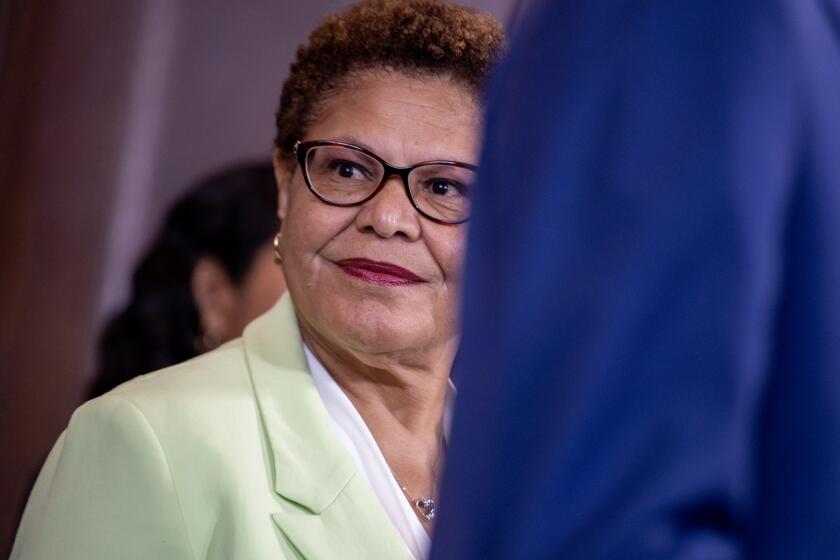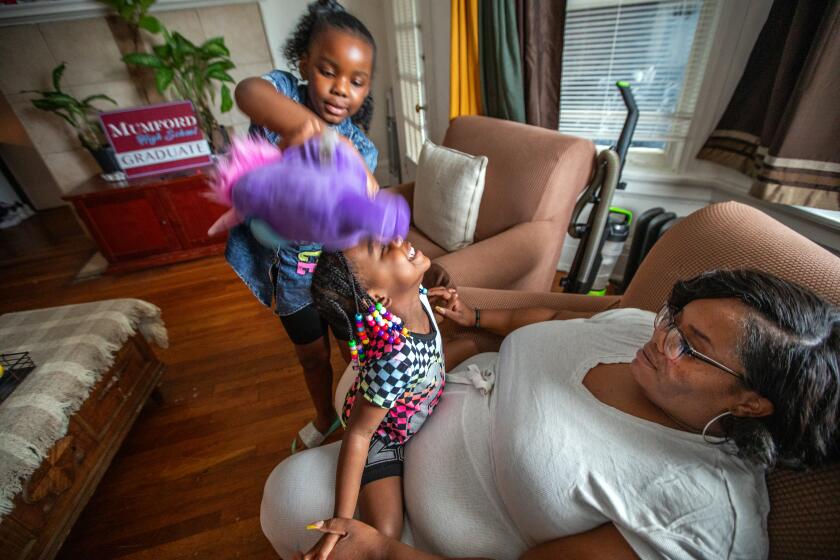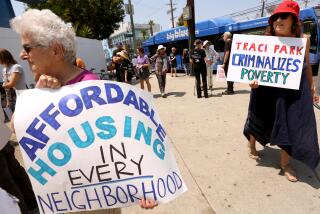Watching from a wheelchair as crucial items are trashed: Unhoused people sue California cities
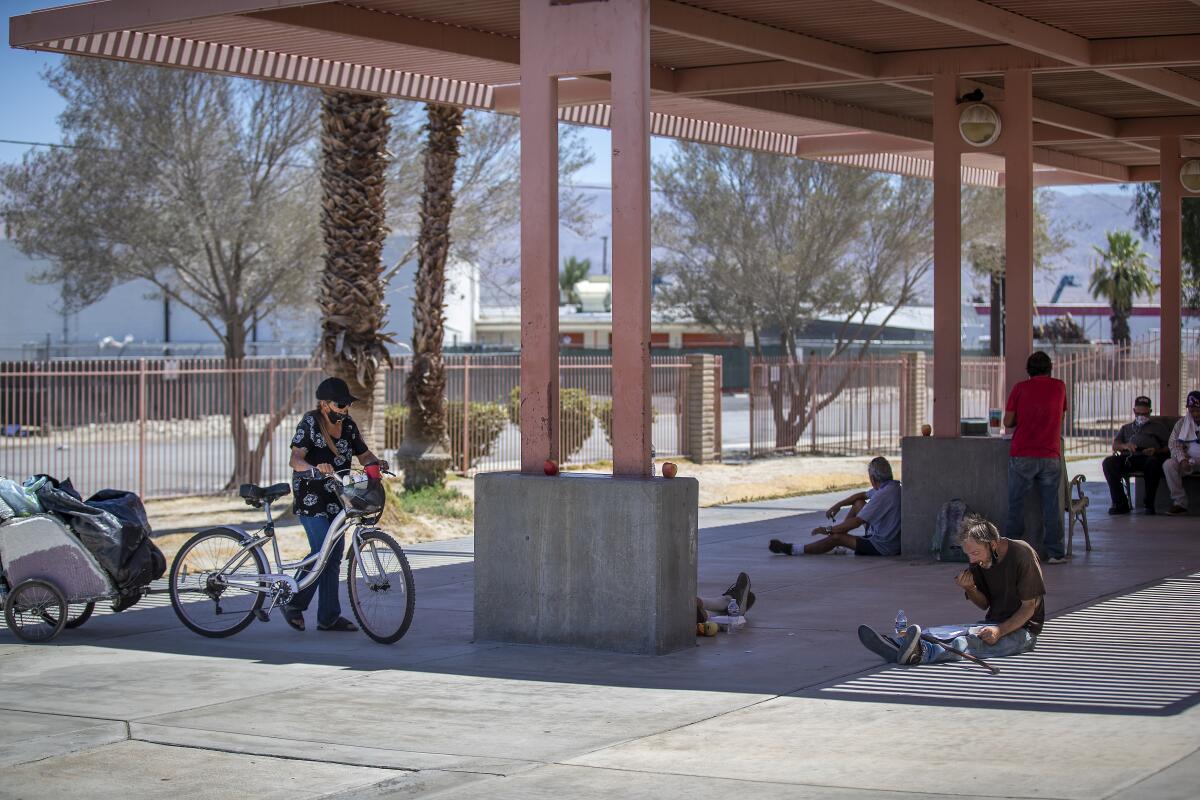
- Share via
While much of San Bernardino was asleep, 55-year-old Lenka John watched from her wheelchair as city employees pitched her medical records, heart monitor, walker and disability assistance paperwork into a trash truck.
She pleaded with the workers to help retrieve her belongings from the compactor. But it was too late.
“I felt violated,” John said.
She, along with a grassroots mutual aid organization and two other unhoused people with disabilities, filed a civil rights lawsuit earlier this month challenging San Bernardino’s practice of seizing and destroying the personal belongings of unhoused people when forcing them to relocate.
The same day that complaint was filed, on Aug. 2, the city of Riverside was hit with a class-action lawsuit alleging many of the same violations.
At least twice over a week, Sacramento has violated a court order against clearing homeless encampments as temperatures hit triple digits.
The lawsuits against the Inland Empire’s two largest cities are the latest accusing California municipalities of violating the constitutional rights of unhoused people during encampment sweeps.
The actions are meant to send a message to the cities that targeting their “most vulnerable residents is not something that will be tolerated,” said Brooke Weitzman, executive director of the Elder Law and Disability Rights Center, which is representing plaintiffs in both cases.
Riverside and San Bernardino, she said, chose to continue “criminalizing instead of looking at evidence-based solutions.”
The city of Riverside declined to comment on pending litigation. The city of San Bernardino, as well as its public works department and city attorney’s office, did not respond to requests to comment.
She could keep what fit on her wheelchair
John said that upon learning she would have to leave a homeless encampment at Meadowbrook Park, where she had been staying for months, she submitted accommodation requests to the city of San Bernardino.
Ahead of and on the day of the May 18 sweep, she asked the city for help moving and finding somewhere she could stay with her service dog. But she said her requests went unanswered. When it came time to leave, she could take only what fit on her wheelchair
“I asked specifically if they could help me move, and they didn’t,” she said. “I don’t feel that they were listening. I don’t feel they actually cared.”
In San Bernardino, dozens of unhoused residents have been forced out of parks in the last few months as those parks have closed for “temporary” maintenance, the lawsuit says.
In a rural California town, there is little help for the unhoused, who are endangered by extreme heat.
The closures coincided with residents demanding that the City Council do something about encampments at those parks — where many unhoused people with disabilities had stayed for months due to the flat, accessible sidewalks, shade and access to food distribution services, the lawsuit states.
Ahead of the park closures, 15 people with disabilities submitted accommodation requests to the city, seeking help moving and finding accessible alternatives to relocate. Nearly all of those requests went unanswered, the lawsuit says.
“Not only did the city not accommodate people, but they didn’t even respond to those requests,” said Kath Rogers, a staff attorney at the American Civil Liberties Union of Southern California, which is also representing plaintiffs in the case against San Bernardino.
Even then, if city workers conducting the sweeps saw “people in wheelchairs or walkers who couldn’t comply,” they should have provided accommodations at that time, she said.
Mayor Karen Bass has gotten a big ask from the U.S. Dept. of Housing and Urban Development, which has agreed to allow LA to put homeless people into housing before they compile all the documentation necessary to prove their eligibility.
The lawsuit argues that the city violated the Americans With Disabilities Act and the 4th, 5th and 14th Amendments to the U.S. Constitution in seizing and destroying the plaintiffs’ belongings without legal justification or reasonable warning, and in ignoring their requests for disability accommodations.
It also argues that San Bernardino’s actions violated its own policies. Last year, in a pre-litigation settlement with ACLU of Southern California, the city agreed to refrain from confiscating or destroying personal property during “cleanups.” The settlement was reached after the city threw away vital medication belonging to an unhoused man, Rogers said.
On Aug. 9, the plaintiffs filed a motion for a preliminary injunction that, if granted, would stop the city from relocating unhoused people or removing their property until a plan accommodating those with disabilities is put in place. A court hearing is scheduled for Sept. 18.
Such legal action is not new in California. In 2012, the U.S. 9th Circuit Court of Appeals upheld an injunction preventing the city of Los Angeles from summarily destroying the property of unhoused people. In 2021, the court upheld another injunction that barred L.A. from seizing and destroying publicly stored “bulky items.” The latter is part of an ongoing lawsuit.
The public tends to blame homelessness on poverty, drug use, crime or warm weather. But other cities don’t have L.A. levels of homelessness. They have more housing.
After being forced to relocate, the two other plaintiffs in the lawsuit against San Bernardino — Noel Harner and James Tyson, who both rely on wheelchairs — said they ultimately had to move to areas that were not wheelchair-accessible.
Harner wrote in a declaration that he is living on the side of a road near Perris Hill Park, where he has to crawl and drag his wheelchair into a busy street to leave his tent. His current situation makes him feel “unsafe,” he wrote.
The latest homeless count estimated that there were more than 1,000 unsheltered people in San Bernardino. Of those who responded to surveys, more than 40% reported a disability that made it difficult to live independently.
3 minutes to grab belongings or face arrest
An unhoused woman in Riverside said she suffered two seizures, during which she cracked her skull, after her medication was taken during an encampment clearing in June, according to a declaration submitted in the lawsuit against that city.
Jade Anderson wrote that police gave her three minutes to grab her belongings or face arrest, despite a written notice from the city that should have granted her three days. Her state-issued ID, bank and debit cards, blankets and seizure medication were supposed to have been taken to the Riverside Access Center, according to the notice, but she could not find any of her belongings when she arrived.
Her declaration, along with several others, was submitted alongside a motion for a temporary restraining order against the city of Riverside that was filed Wednesday.
If approved by the court, the order would stop the city from seizing and destroying the property of unhoused people until it has a plan to do so in compliance with the Constitution, Weitzman said.
That motion is the most recent development in a class-action lawsuit filed Aug. 2 on behalf of Riverside All of Us or None — a grassroots organization that conducts street outreach for formerly incarcerated people — and four named plaintiffs. The suit claims to represent a class of more than 70 unhoused people whose property was seized and destroyed throughout the city from around January 2022 to the present.
Similar to the San Bernardino complaint, the lawsuit alleges 4th, 5th and 14th Amendment violations, as well as discrimination against unhoused people with disabilities. It argues that the city and chief of police unconstitutionally seized property, often failing to provide reasonable notice to pack up, and have made it nearly impossible for individuals to reclaim their belongings.
Belongings that aren’t destroyed on-site are thrown into storage containers in an unorganized way, the lawsuit alleges. It further argues that individuals are often given such a small window to reclaim their belongings that many can’t get there in time — especially because the trek can be arduous if not impossible for people with disabilities.
The suit argues that the city knew or should have known that a high proportion of the unhoused population includes people with disabilities and that it violated the Americans With Disabilities Act by failing to “make reasonable modifications” to protect “life-saving property” and ensure accessible transportation to reclaim seized belongings.
In California, more than a third of unhoused people experienced chronic homelessness exacerbated by a disability, according to a recent report from the California Budget & Policy Center.
“Every time these property seizures happen, it sets people back because they either lose critical documents or identification, like a birth certificate or ID, that makes it so they can’t apply for jobs or housing opportunities,” Weitzman said. “And even when it’s things like tents and clothes, that still means they have to spend their time finding or waiting for benefits to replace those items instead of finding programs that get long-term stable housing.”
More to Read
Sign up for Essential California
The most important California stories and recommendations in your inbox every morning.
You may occasionally receive promotional content from the Los Angeles Times.

